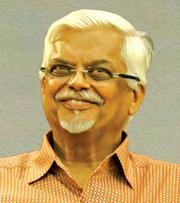

SANJAYA BARU
IN June every year the media publishes articles recollecting the imposition of Emergency by Indira Gandhi’s government in June 1975. It remains to be seen what impact the results of the on-going general election would have on such recollections this June. Will there be relief that a weaker ruling party will now retreat from the undemocratic excesses of the past five years or will there be fear that a re-empowered ruling party will impose even more restrictions on individual freedoms? If, as some predict, there is a change in government, it would remain to be seen what lessons the incoming rulers have learnt from the outgoing ones.
Political activist and journalist Prabir Purkayastha’s arrest last October and his securing bail six months later remind us of the fact that politicians elected to government may come and go, but the instruments of the State continue to act in an arbitrary manner, empowering one set of politicians after another.
In his book The Emergency Chronicles: Indira Gandhi and Democracy’s Turning Point (Viking Penguin, 2018), sociologist Gyan Prakash recalls the original incarceration of Prabir Purkayastha, founder of news website newsclick.com, on September 30, 1975. The Delhi police arrived at the Jawaharlal Nehru University campus in search of a student leader, D.P. Tripathi, and arrested Purkayastha instead. Unwilling to acknowledge a case of mistaken identity, the police locked up Purkayastha for several months, moving him from one jail to another. No charge was levelled against Purkayastha at the time of his arrest.
Almost half a century later, on October 3, 2023, the government of Narendra Modi locked up Purkayastha yet again and once again without providing any reason. Trumped up and dubious evidence was produced once again. Granting him bail on May 15, 2024, a Supreme Court judge observed that any person arrested for any offence “has a statutory right to be informed about the grounds of arrest in writing and a copy of such written grounds of arrest have to be furnished to the arrested person as a matter of course and without exception at the earliest”.
Purkayastha’s bail came days after Gautam Navlakha’s. Others who were arbitrarily picked up and managed to secure bail after months of languishing in jail include political prisoners such as Sudha Bharadwaj, G.N. Saibaba and Siddique Kappan. Two phenomena are common to the Emergency months and the Modi years — arbitrary arrest of political activists and lack of adequate media support for the rule of law and for basic freedoms assured in the Constitution. Each of their cases calls to mind a Kafkaesque experience.
After being in jail for months on end they have all been freed with no evidence yet in the public domain on whether or not their incarceration was justified. It took repeated appeals going all the way up to the Supreme Court for most of them to secure bail. If the police and the lower courts failed the innocent citizen, so too has the media.
While one must criticize the police and other State agencies that have acted in an arbitrary and non-transparent manner, one must also criticize mainstream media for not playing its part as the Fourth Estate and the guarantor of individual freedoms. On this score, the media’s role in the Modi years has been far worse than its role in the Indira years. During the Emergency era, editors and publishers could at least argue in their defence that there was an official policy of censorship. Only a few demonstrated the courage to defy censorship. Most crawled when asked to bend. Only a few, like the then newly launched India Today magazine, were enthusiastic defenders of the Emergency. In fact, many believed India Today was launched to defend the Emergency.
During the Modi era, mainstream media not only crawled when asked to bend but prostrated itself, doing sashtanga namaskaram to the powers that be. While institutions like the Enforcement Directorate, Central Bureau of Investigation, Income Tax Department, National Investigation Agency and the police have all been criticized for not adhering to their stated roles and responsibilities, and for acting in a partisan manner, the mainstream media’s record has been no better.
The mainstream media’s resounding silence on serious transgressions of law by the government and its various institutions and agencies has hugely damaged its professional reputation. It is into this vacuum that several poorly funded but professionally robust journalists have stepped in and virtually sidelined the mainstream media in public discourse. Consider the readership and viewership of the media platforms of Dhruv Rathee, Ravish Kumar, Karan Thapar and journalists at thewire.in, newslaundry.com, thenewsminute.com as well as the popularity of individual influencers on YouTube and one realizes how irrelevant the Arnabs, Navikas and Smitas have become to political news coverage.
What is interesting in this past month is that ‘prime time’ news has been edged out by cricket. Between 7 pm and midnight most households are glued to cricket. In the 2024 elections we have probably witnessed for the first time in over a quarter-century the marginalization of television in elections. Even TV news is accessed on social media.
The failure of large segments of the media is as much a blot on our democracy as the non-transparent administration of law by institutions of the State. When caught in the labyrinthine ways of officialdom, the media should come to the aid of the citizen, showing a way out. The media’s silence, compounded by either ignorance or partisanship, only increases the burden of the State on the citizen. The media should liberate the citizen from Kafka’s world, not become part of it.
Sanjaya Baru is a writer and Distinguished Fellow at the United Service Institution of India
Comments
Currently there are no Comments. Be first to write a comment!



